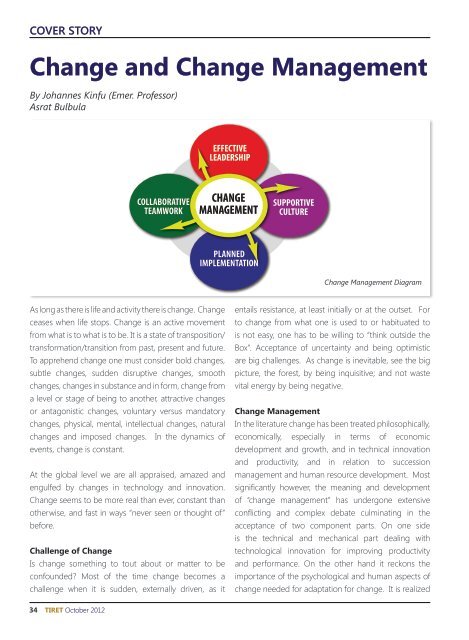TIRET October 2012 Issue - MIDROC Ethiopia
TIRET October 2012 Issue - MIDROC Ethiopia
TIRET October 2012 Issue - MIDROC Ethiopia
Create successful ePaper yourself
Turn your PDF publications into a flip-book with our unique Google optimized e-Paper software.
COVER StORy<br />
Change and Change Management<br />
By Johannes Kinfu (Emer. Professor)<br />
Asrat Bulbula<br />
34 TireT <strong>October</strong> <strong>2012</strong><br />
COLLABORATIVE<br />
TEAMWORK<br />
As long as there is life and activity there is change. Change<br />
ceases when life stops. Change is an active movement<br />
from what is to what is to be. It is a state of transposition/<br />
transformation/transition from past, present and future.<br />
To apprehend change one must consider bold changes,<br />
subtle changes, sudden disruptive changes, smooth<br />
changes, changes in substance and in form, change from<br />
a level or stage of being to another, attractive changes<br />
or antagonistic changes, voluntary versus mandatory<br />
changes, physical, mental, intellectual changes, natural<br />
changes and imposed changes. In the dynamics of<br />
events, change is constant.<br />
At the global level we are all appraised, amazed and<br />
engulfed by changes in technology and innovation.<br />
Change seems to be more real than ever, constant than<br />
otherwise, and fast in ways “never seen or thought of”<br />
before.<br />
Challenge of Change<br />
Is change something to tout about or matter to be<br />
confounded? Most of the time change becomes a<br />
challenge when it is sudden, externally driven, as it<br />
EFFECTIVE<br />
LEADERSHIP<br />
CHANGE<br />
MANAGEMENT<br />
PLANNED<br />
IMPLEMENTATION<br />
SUPPORTIVE<br />
CULTURE<br />
Change Management Diagram<br />
entails resistance, at least initially or at the outset. For<br />
to change from what one is used to or habituated to<br />
is not easy, one has to be willing to “think outside the<br />
Box”. Acceptance of uncertainty and being optimistic<br />
are big challenges. As change is inevitable, see the big<br />
picture, the forest, by being inquisitive; and not waste<br />
vital energy by being negative.<br />
Change Management<br />
In the literature change has been treated philosophically,<br />
economically, especially in terms of economic<br />
development and growth, and in technical innovation<br />
and productivity, and in relation to succession<br />
management and human resource development. Most<br />
significantly however, the meaning and development<br />
of “change management” has undergone extensive<br />
conflicting and complex debate culminating in the<br />
acceptance of two component parts. On one side<br />
is the technical and mechanical part dealing with<br />
technological innovation for improving productivity<br />
and performance. On the other hand it reckons the<br />
importance of the psychological and human aspects of<br />
change needed for adaptation for change. It is realized



